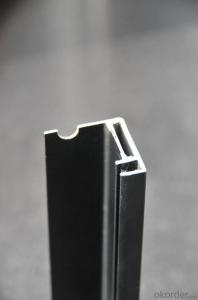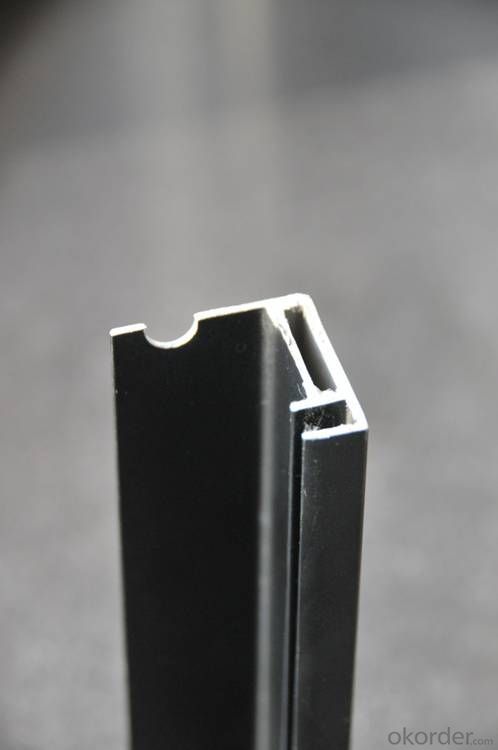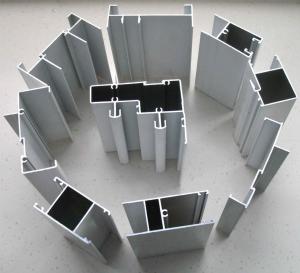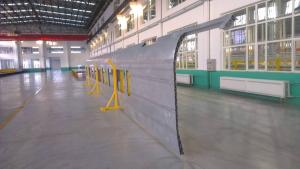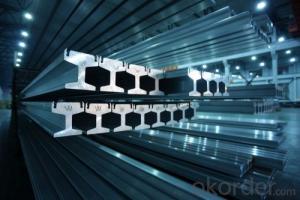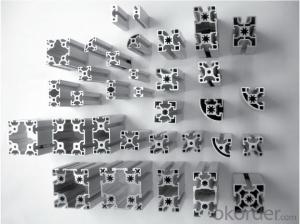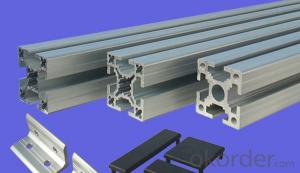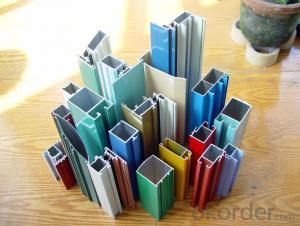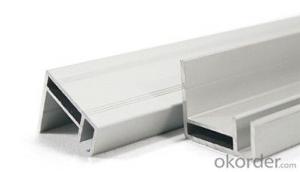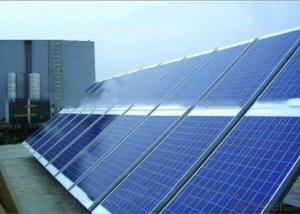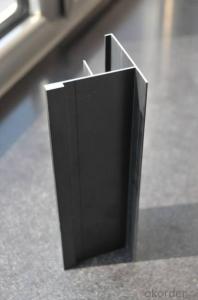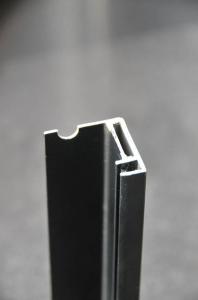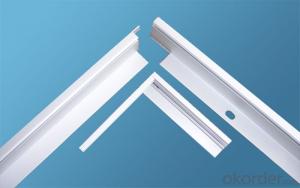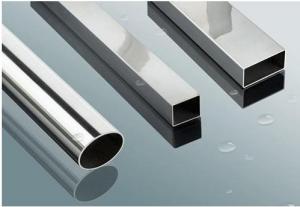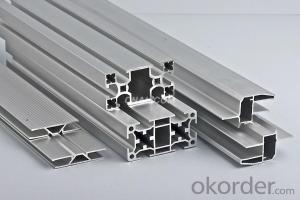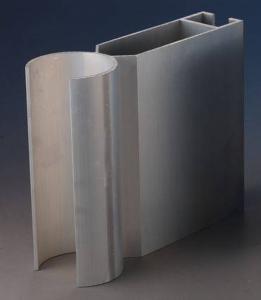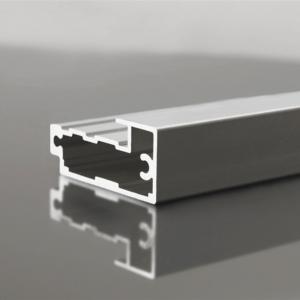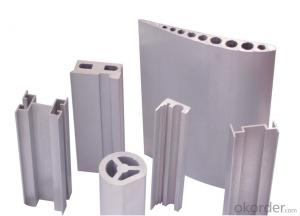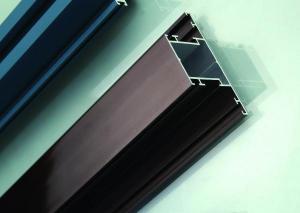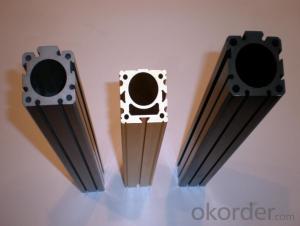Aluminum Profiles T Slot Miter T Track Solar Panel Aluminum Frame
OKorder Service Pledge
OKorder Financial Service
You Might Also Like
We are the largest aluminum profilemanufacture in
Provide full type of solar module frame:
Size:30x25mm
35x35mm
35x40mm
Other size can be accepted.
Material | Alloy Aluminum 6063,6061,6005,6082 or customer nominated |
Temper | T3, T4, T5, T6 and other |
Surface | Anodize, electrophoresis, powder coating, PVDF coating, wood grain painting, etc. |
Colour | Any colour based on Standard Germany RAL Mark |
Length | Not more than 16 meters |
Good Package | Inner plastic film /outside carton/wooden pallets |
Payment Method | T/T, L/C, etc |
Delivery Time | Normally 2-4 weeks, Delivery time can be consulted. |
Press Machine | 500-12500 tons all together 93 press lines. |
Fabrication | 1. Solar module frame; 2. Drilling; 3. Bending; 4. Cutting; 5. etc. |
Certificate | ISO/TS 16949,DNV,IRIS,CCS,AFA,etc. |
Dies | 1. Using our dies, no fee; |
2. Using customer drawing, opening dies, usually about 5~50 tons then the dies cost can be refunded. | |
3. Die cost is negotiable base on the order quantity | |
Capability | Annual output 800,000 tons |
- Q: It is now the most urban rail trains, as well as the manufacturing methods and processes of large parts profiles used in the manufacture of CRH3 type emus.
- According to the technical requirements of the components, the process is as follows: aluminum ingot - Dissolution alloy ratio - into rod material - extrusion forming - aging - surface treatment - cut by component size - finished product!
- Q: This question asks whether aluminum profiles can be utilized as a material for exterior wall insulation panels.
- <p>Yes, aluminum profiles can be used for exterior wall insulation panels. They are commonly used due to their durability, corrosion resistance, and lightweight properties. Aluminum profiles provide structural support and can be combined with insulation materials such as polyurethane or mineral wool to create efficient thermal insulation. They are also compatible with various cladding systems, making them a versatile choice for exterior wall insulation.</p>
- Q: Household aluminum profiles, which brand of cost-effective? Recommend!
- Cost performance is better, in our Nanshan factory is called a good fight,
- Q: What are the possible alternatives to aluminum extrusions in the construction industry?
- <p>Yes, there are several alternative materials that can replace aluminum extrusions in construction projects. These include steel, which is strong and durable but heavier; fiberglass, known for its lightweight and corrosion resistance; and thermoplastics like PVC, which are cost-effective and easy to work with. Each material has its own advantages and limitations, and the choice depends on the specific requirements of the project, such as strength, weight, cost, and environmental factors.</p>
- Q: Are aluminum profiles suitable for use in the telecommunications industry?
- Yes, aluminum profiles are suitable for use in the telecommunications industry. Aluminum profiles offer a lightweight and durable solution for various applications in the telecommunications field, such as antenna mounts, equipment racks, enclosures, and cable management systems. They offer excellent corrosion resistance, thermal conductivity, and electromagnetic shielding properties, making them a reliable choice for supporting and protecting telecommunications equipment. Additionally, aluminum profiles can be easily customized and fabricated to meet specific design requirements, making them highly versatile for use in the telecommunications industry.
- Q: Is it possible to use aluminum profiles for outdoor applications like fences and railings?
- <p>Yes, aluminum profiles are commonly used for outdoor applications such as fences and railings. They are favored for their resistance to corrosion, lightweight properties, and durability. Aluminum can withstand harsh weather conditions without rusting, making it an ideal material for outdoor use. Additionally, it is low maintenance, as it does not require painting or frequent repairs. The profiles can be powder-coated or anodized for enhanced protection and aesthetic appeal.</p>
- Q: This question asks for a comparison of the benefits and drawbacks of utilizing aluminum profiles in the construction of buildings.
- <p>Aluminum profiles in building construction offer several advantages such as high strength-to-weight ratio, corrosion resistance, and ease of fabrication. They are lightweight, which reduces the load on structures, and they are recyclable, contributing to sustainability. Additionally, aluminum profiles can be easily shaped and joined, making them versatile for various architectural designs. However, they also have disadvantages. Aluminum is a good conductor of heat, which can lead to thermal bridging and energy inefficiency if not properly insulated. It can also be more expensive than some traditional materials like steel or wood. Moreover, aluminum's light color can cause glare issues, and it may require additional protective coatings to prevent weathering and maintain its appearance over time.</p>
- Q: This question asks about the various materials used for insulation purposes when working with aluminum profiles.
- <p>Different types of insulation materials used with aluminum profiles include thermal insulation materials such as polyurethane foam, mineral wool, and polystyrene. These materials help in reducing heat transfer and maintaining temperature control. Additionally, electrical insulation materials like PVC, polyethylene, and silicone rubber are used to prevent electrical conductivity and protect against electrical hazards. Acoustic insulation materials like fiberglass and soundproofing foam are also used to reduce noise transmission through aluminum structures. Each type of insulation serves a specific purpose and is chosen based on the application's requirements.</p>
- Q: Are aluminum profiles suitable for food processing or storage facilities?
- Aluminum profiles prove to be suitable for food processing or storage facilities. In these environments, aluminum, being a highly versatile material, offers numerous advantages. To begin with, aluminum's corrosion resistance guarantees its resilience against moisture, food acids, and commonly used cleaning agents in food facilities. Consequently, it becomes an ideal choice for areas where hygiene and cleanliness hold paramount importance. Moreover, aluminum profiles possess the unique characteristic of being lightweight yet sturdy, rendering them easily manageable and installable. This feature proves particularly advantageous in food processing facilities that necessitate regular equipment maintenance and reconfigurations. In addition, aluminum serves as a non-toxic material, ensuring that it does not taint food products during the processing or storage stages. Furthermore, its exceptional heat conductivity enables efficient temperature control within processing facilities. Furthermore, aluminum profiles can be effortlessly cleaned and sanitized. This not only diminishes the risk of bacterial growth but also ensures compliance with food safety regulations. In conclusion, the durability, corrosion resistance, lightweight nature, non-toxicity, and ease of maintenance collectively establish aluminum profiles as an exceptional choice for food processing or storage facilities.
- Q: Why should aluminum surface treatment process?
- In order to strengthen the performance of aluminum material.Anodizing, passivation, electroplating, spraying, and some other surface treatment processes are designed to "resist corrosion" and allow aluminum to last longer without oxidation.
Send your message to us
Aluminum Profiles T Slot Miter T Track Solar Panel Aluminum Frame
OKorder Service Pledge
OKorder Financial Service
Similar products
Hot products
Hot Searches
Related keywords
